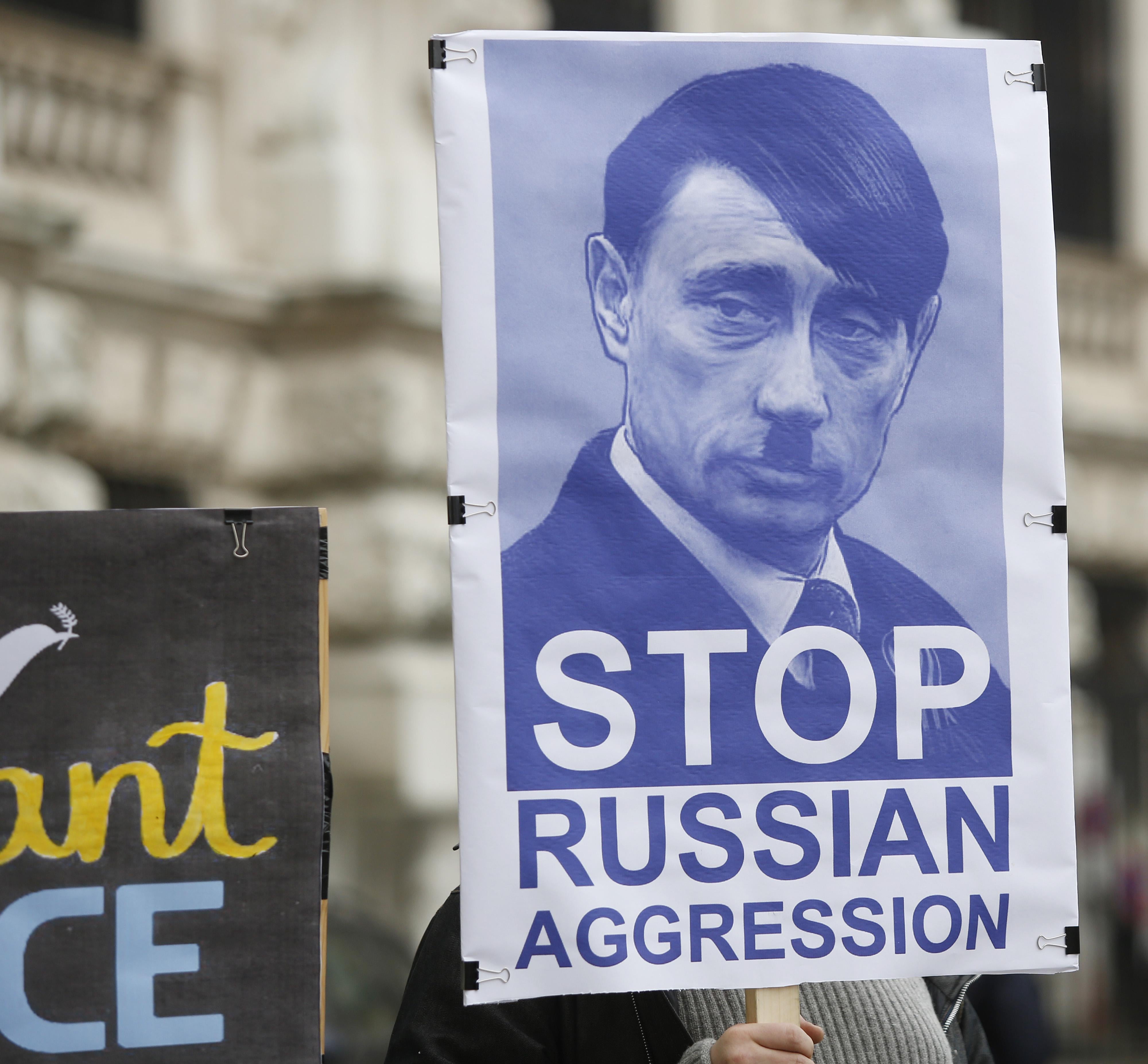The irascible Syrian Twitter activist “The 47th” joked yesterday that “US politicians are the Hitlers of using Hitler in analogies.”
Indeed, the comparisons between Russia’s incursion into Crimea and the early days of Nazi Germany’s expansion are flying fast and loose in Washington. As my colleague David Weigel noted yesterday, some Republicans are almost gleefully welcoming Hillary Clinton into the fold after remarks she made on the subject at an event in Long Beach, which included “the sort of analogy that would light up Media Matters or your favorite conservative derp site if uttered by a Republican.”
Here’s what she said:
Now if this sounds familiar, it’s what Hitler did back in the ‘30s. All the Germans that were … the ethnic Germans, the Germans by ancestry who were in places like Czechoslovakia and Romania and other places, Hitler kept saying they’re not being treated right, I must go and protect my people, and that’s what’s gotten everybody so nervous.
The analogy no doubt made a lot of liberal Hillary supporters groan, but in and of itself, it doesn’t seem all that ridiculous to me. Hitler did argue that the western rim of Czechoslovakia should rightfully be part of German territory because of the 3 million ethnic Germans living there. The arguments used by some Russian nationalists about places like Abkhazia, South Ossetia, and Crimea do bear a superficial resemblance to this worldview.
Peter Harris elaborates in the National Interest:
Russia today is a resurgent great power led by an autocratic strongman with a penchant for fanning chauvinist sentiment at home. A large part of Vladimir Putin’s domestic appeal is the perception that he rescued Russia after a decade in the doldrums. The 1990s were a period of humiliation for Russians, when their state and economy collapsed around them. Living standards plummeted and corruption was rife. On the world stage, the former superpower was forced to endure the indignity of the U.S. and its allies meddling in its traditional spheres of influences. Under Putin, this trend of national ignominy has been reversed—a process still underway, to be sure, but an achievement for which Putin has earned the admiration of many of his compatriots.
Putin also is popular among those in Russia’s “Near Abroad” who have resisted westernization—in Belarus, eastern Ukraine, the breakaway Georgian republics of Abkhazia and South Ossetia and (at times) the Central Asian republics, for example. Especially among embattled elites (such as Viktor Yanukovych and his henchmen) and Russia’s “beached diaspora” (that is, those Russian communities which found themselves living in independent, often virulently anti-Russian countries following the collapse of the Soviet Union), Putin’s Russia is seen as a protector.
The real problem isn’t the comparison itself, it’s the lesson that is generally drawn from it. The invocations of Munich and Sudetenland have become a shorthand for the argument that seeking a negotiated solution to a crisis caused by a country’s violations of international norms will only invite further aggression and eventual catastrophe. Until now, it was invoked most frequently in reference to Iran’s nuclear ambitions. (It also ignores that more contemporary scholarship has suggested that Neville Chamberlain was far more realistic about the threat posed by Nazi Germany and acted far more responsibly than his historical caricature would suggest.)
It’s not the most original point to suggest that while historical analogies can be useful to leaders in a crisis situation, they can also be misleading. Not all negotiated settlements will turn out like Munich. Not all military interventions will end up like the Vietnam War.
Richard Neustadt and Ernest May’s 1986 book Thinking in Time, which provides a host of examples of policymakers being led astray by reaching for the nearest available historical analogy, is a staple of undergraduate poli-sci syllabi. The authors recommend simply that that leaders “stop, look, listen” before invoking historical analogies, taking a moment to note what is known vs. unclear about the situation at hand as well as the similarities and differences between the two situations being compared.
In the case of the Putin-Hitler comparison, it’s true that we have a nationalist strongman leader of a resurgent power with a historical grudge using his country’s scattered diaspora as a pretext for annexing territory from neighboring countries. Differences might include, among many others, the relative military balance in the world today, the interconnectedness of the global economy, Putin’s relatively limited ability to project power beyond his immediate neighborhood, and the fact that, while the country’s human rights record shouldn’t be downplayed, there’s no evidence to suggest Russia is wantonly slaughtering civilians or plotting a massive genocide.
Harris’ article actually manages to show that it’s possible to talk about “Munich’s lessons for the Ukraine crisis” without suggesting that Putin is the same as Hitler, or that the two situations will play out the same way, or that any compromise will inevitably lead down the path to World War II.
But the shorthand that “Munich” has become in contemporary U.S. political debate, and the frequency with which it is abused, makes it very hard to talk about those lessons without drifting into Godwin’s Law territory.
